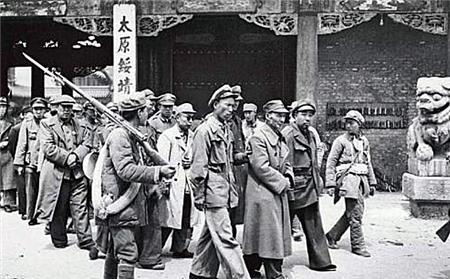The People's Liberation Army has always practiced a preferential treatment policy for prisoners, and throughout the liberation period, many nationalist generals have become prisoners of our army, and some war criminals of the nationalist army who have performed well in the process of reform have been released quickly. Those who behaved stubbornly were also released after several batches of amnesties.
In general, the length of detention has been long and short, but there is no threat to life. But there are exceptions, after 3 Nationalist generals were captured, the People's Liberation Army directly executed them, who are they? What crime was committed? Let's go down!

1. Dai Bingnan
Dai Bingnan was a native of Shandong, and during the War of Resistance Against Japanese Aggression, he successively served as the commander of the 181st Regiment of the 31st Division and the acting commander of the 30th Division. After the surrender of the Japanese army, he successively served as the commander of the 37th Brigade of the 30th Division and the commander of the 27th Division of the 30th Army. Later, in 1944, he joined the military department under Yan Xishan. At the end of 1948, before the Taiyuan Campaign was ready to start, Huang Qiaosong, commander of the 30th Army, decided to revolt and throw himself into the arms of the People's Liberation Army.
Dai Bingnan followed Huang Qiaosong for 16 years, and was one of the fierce generals under Huang Qiaosong and his beloved general, so Dai Bingnan naturally knew all about the plan of this uprising. But surprisingly, Dai Bingnan betrayed his superiors who had followed him for 16 years and turned around and reported the uprising plan to Yan Xishan. At this point, Huang Qiaosong's plan to revolt was exhausted, and he was unfortunately arrested by Yan Xishan and shot shortly afterwards.
And Dai Bingnan was also promoted to the commander of the 30th Army because of his betrayal of his old superiors. Who knew that 'the good times were not long', after the Battle of Taiyuan, Dai Bingnan was defeated and became a prisoner of the People's Liberation Army. A few days later, due to Dai Bingnan's betrayal of his superiors, Huang Qiaosong's uprising plan failed, causing great losses to the People's Liberation Army, and was shot at the age of 43.
2. Zhao Shiling
A native of Shanxi, Zhao Shiling graduated from the 11th term of the Army Army, and has since served in the Jin Army for a long time, serving as the commander of the death squad and brigade commander. The Death Squad was established by Yan Xishan and the CCP, and later grew to 100,000 troops. In Yan Xishan's eyes, the number of death squads was too large and still out of control, and on December 1, 1929, the 'Jinxi Incident' was launched to "encircle and suppress" the dueling death squads.
Zhao Shiling, a staunch supporter of Yan Xishan, immediately led 4 regiments to 'mutiny' and returned to Yan Xishan's Jin army. At the same time, she wantonly slaughtered all the CCP members in these 4 regiments and committed a major crime. After that, Zhao Shiling was deeply loved by Yan Xishan and was promoted to the position of division commander and military commander. In early 1949, after the Battle of Taiyuan, the Jin army was defeated, and Zhao Shiling was captured by the People's Liberation Army, and was shot and disposed of for massacring a large number of CCP members, at the age of 44.
3. No.1 in Japan
Li Benyi, a native of Guangxi, graduated from the first batch of higher education classes of the Central Military Academy, and has since served as a squad leader and battalion commander in the 'Seventh Steel Army'. After the outbreak of the War of Resistance Against Japan, he served as the commander of the 138th Division of the 48th Army and led his troops to participate in the anti-Japanese battles of Xuzhou, Henan, and Suizao.
In the Gui Army, Li Benyi was a rising star, but he was deeply appreciated by Bai Chongxi, and was later promoted by Bai Chongxi to the commander of the Gui Army's ace army, the 'Seventh Steel Army'. In 1949, the People's Liberation Army launched the Hengbao Campaign, the Seventh Steel Army was completely destroyed, and although Li Benyi escaped by chance, he was soon taken prisoner by the People's Liberation Army. Soon after, the People's Liberation Army insisted on shooting Li Benyi. Because during the War of Resistance Against Japanese Aggression, Li Benyi had brutally killed 30,000 people in Hefei and committed a major crime.